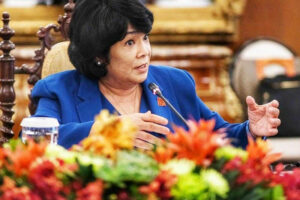THE Department of Environment and Natural Resources (DENR) said disaster risk reduction need to be flexible in response to the rapidly shifting patterns of tropical cyclones.
“Responses need to be adaptive. They need to be able to address shifting timelines. As we know, of course we now experience rapid intensification of tropical cyclones that we have not experienced previously,” Environment Secretary Maria Antonia Yulo-Loyzaga said during a briefing for the Asia-Pacific Ministerial Conference on Disaster Risk Reduction (APMCDRR).
“We can experience this cascading set of risks that cut across not just national systems, local systems, but also global systems in terms of their impacts,” Ms. Yulo-Loyzaga added.
She said that the DENR is looking at taking approaches that will allow it to integrate into the Philippine Development Plan the Philippines’ international commitments like the United Nations Framework Convention on Climate Change, the UN Convention on Global Biodiversity, and the UN sustainable development goals.
“There are other international commitments that have to do with plastics, with urban development. We’re trying to see how all of these actually need to intersect in order for us to reach what we believe should be shared goals among countries but also within the (Philippines),” she said.
According to a World Bank report, the Philippines is among the top countries most prone to climate risk disasters.
The country is also located within the Pacific Ring of Fire, an area with active seismic activity. It also experiences about 20 tropical cyclones each year.
The Philippines is currently hosting the APMCDRR which is expected to draw in 2,500 delegates from over 60 countries. The conference will be held between Oct. 14 and 17.
“We hope to learn and continuously dialogue with the different countries that are here,” she said.
The conference seeks to assess progress in implementing the Sendai Framework, which hopes to reduce the impact of calamities on mortality, health, economies, and infrastructure.
“Now more than ever before in the Philippines as well as in the region, the work on disaster risk reduction is no longer seen as a niche subject, but it is a core development challenge of our times,” Kamal Kishore, special representative of the UN Secretary-General for Disaster Risk Reduction said.
“The money we put in for resilience is not expenditure, it is an investment,” Mr. Kishore added.
The Philippines has said that is seeking closer collaboration with regional partners to improve its access to disaster risk financing. — Adrian H. Halili
